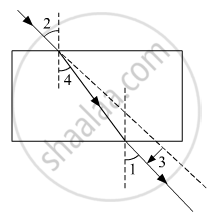Advertisements
Advertisements
Question
State whether the following statement is true or false:
The planets twinkle at night due to atmospheric refraction of light.
Solution
False. The planets do not twinkle at all because of the atmospheric refraction of light. As the planets are large bodies and very close to the earth, the continuously changing atmosphere cannot cause much deviations in the light coming from the planets. The brightness of the planets remains the same and they do not appear to twinkle.
APPEARS IN
RELATED QUESTIONS
Explain why the planets do not twinkle.
The correct sequencing of angle of incidence, angle of emergence, angle of refraction and lateral displacement shown in the following diagram by digits 1, 2, 3 and 4 is:

(a) 2, 4, 1, 3
(b) 2, 1, 4, 3
(c) 1, 2, 4, 3
(d) 2, 1, 3, 4
The phenomenon that causes the twinkling of stars is refraction of light.
Name two effects produced by the atmospheric refraction.
What is atmospheric refraction? What causes atmospheric refraction?
As light from a far off star comes down towards the earth:
(a) it bends away from the normal
(b) it bends towards the normal
(c) it does not bend at all
(d) it is reflected back
The day is longer on the earth by about 4 minutes because:
(a) the earth is round in shape
(b) the earth rotates on its axis
(c) the earth revolves around the sun
(d) the earth has atmosphere
By how much time the day would have been shorter if the earth had no atmosphere?
Which of the following is not caused by the atmospheric refraction of light?
(a) twinkling of stars at night
(b) sun appearing higher in the sky than it actually is
(c) sun becoming visible two minutes before actual sunrise
(d) sun appearing red at sunset
Refraction of light by the earth’s atmosphere due to variation in air density is called ____________.
